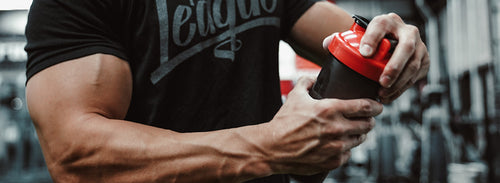When people talk about training supplements like protein shakes or pre-workouts, they're often associated with photos of jacked up men grunting at the gym, looking for a boost to get that pump.
While that may sound like the norm, the fact is that plenty of women are gym and fitness enthusiasts as well. It's not just the boys club anymore.
Not just at the gym, women are also interested in a variety of other challenging and intensive exercises, be it running, gymnastics, or high-intensity interval training. And to fuel these activities, many women turn to pre-workout supplements.
So what benefits do women get from pre-workout supplements, and are those benefits different for women than they are for men?
If you're considering adding pre-workout supplements to your diet, check out this breakdown of the effects of pre-workout on women, and find the right pre-workout for you.
Effects of Pre-workout on Women
1. Caffeine
One of the most commonly found ingredients in pre-workout, caffeine is often included for its ergogenic effects. Simply put, caffeine is an energy booster known to improve your endurance levels and reduce your perception of effort. As a result, you may feel like you’re able to train longer without working any harder.
While the extent of the effects of caffeine differ from person to person, you may already have an idea of your sensitivity to caffeine from drinking coffee or tea. Women who are more sensitive to caffeine may experience a rise in heart rate, alertness, and higher cognitive ability even with a small dose. If that’s you, it’s advisable to avoid taking pre-workout at night to prevent insomnia. And even if you are able to drink lots of coffee without any trouble sleeping at night, remember to try and keep your daily intake under the recommended 400mg a day.
2. Creatine
Similar to protein supplements, creatine fuels muscle growth and aids in recovery after workouts. And it’s not just a perk limited to men; creatine has been shown to help women boost energy and build lean muscles too. Creatine may also help to improve focus and concentration when doing complex workouts that are more mentally stimulating, such as dancing.
Creatine is usually included in pre-workout formulas, but for women who have pre-existing heart conditions, such as high blood pressure, it may be better to opt for a creatine supplement on its own. This is because many pre-workouts include other ingredients that raise heart rate and increase blood flow, which may be dangerous, especially if you are doing high-intensity cardio training.
3. Nitric Oxide Boosters
Ingredients like L-norvaline, L-citrulline and L-arginine all fall under the category of nitric oxide boosters. Nitric oxide boosters improve the ability of the body to deliver much-needed oxygen to the muscles. This is what gives the “muscle pump” feeling, and is the reason why you may find that your muscles look bigger in appearance after an intense workout.
These nitric oxide boosters can also help to delay muscle fatigue, and subsequently improve your endurance during a workout. Experts recommend a dose of 400-500mg in order to feel effects. While you can get them from pre-workout, these boosters are also widely found in an average person’s diet.
4. Branch Chain Amino Acids (BCAAs)
These compounds occur naturally in your body, but supplementing the amount that your body produces has a range of benefits. For one, as body-building proteins, BCAAs help to build muscle mass, hence increasing metabolism in women and making it ideal for those who are working out to lose or maintain weight. They are also helpful in post-workout recovery as they aid your body in the healing process, speeding up recovery and getting you back to the gym faster with less time needed between workouts.
In addition, BCAAs are also known to help balance hormones in women by lowering levels of cortisol, the stress hormone. This in turn helps the body to produce female hormones like progesterone, which are important for a healthy menstrual cycle. BCAAs also help to increase the level of testosterone, making it easier for women to build muscle.
If you don’t want to take pre-workouts containing BCAAs but still want to increase your level of testosterone naturally, try our HYDE Test Surge which is safe for both males and females.
With all these benefits to taking pre-workout, you may be ready to try one before your next workout. Before you do, remember to do your research and only look for trusted brands, such as those that are third party tested like our HYDE pre-workout range.
Additions & Alternatives to Taking Pre-workout
If you are pregnant or breastfeeding, you may want to look to whole foods as alternatives to taking pre-workout supplements. And even if you are not pregnant or breastfeeding, you may still want to incorporate some of these foods in your diet in addition to your pre-workout.
1. Beet Juice for Nitric Oxide Boosters
For those who want to get some of the benefits of nitric oxide boosters, beet juice is a great place to start.Research suggests that drinking beet juice before workouts can help to improve endurance and delay muscle fatigue, giving you an overall better workout. Beet juice also helps to regulate and lower blood pressure by relaxing blood vessels and improving blood flow in the body.
Experts recommend drinking two cups, about 500ml, of juice daily. As beets are also a great source of folate, zinc, iron, magnesium, and copper amongst other essential minerals, you may find yourself revitalized not only for your workout but for the entire day.
2. Watermelon for L-citrulline
To build upon L-citrulline and the benefits it has for endurance workouts, stock up on fruits like watermelon.
While most of us prefer the red variety of watermelon, red watermelons actually have the least amount of citrulline. Instead, select yellow or orange watermelons which contain about 3.5mg of citrulline for every gram of watermelon flesh you consume.
Watermelon leaves are also one of nature’s most saturated sources of citrulline. And yes, they are edible! You may also use the watermelon rinds to make watermelon rind jam, coleslaw or salsa, so as to not waste any of the precious citrulline found in the fruit. Watermelons are full of not only citrulline but also other beneficial minerals and antioxidants.
3. Organ Meat for Creatine
It’s probably no surprise that the compound that helps to build your body muscle is found naturally in organ meat, particularly in the liver, heart, and kidneys. There are plenty of delicious recipes for these, such as having them stir-fried with either rice or noodles, or turned into meat burgers (popular with keto diets). Alternatively, you can also find creatine in meats like beef, pork, and fish. Beef and pork have about one gram of creatine for every pound of meat. As for fish, herring has almost twice the creatine that you’ll get from tuna or codfish.
Unfortunately for vegetarians and vegans, plant-based meals don’t often carry rich amounts of creatine. As such, you may want to consider taking creatine supplements even if you find that pre-workout is not for you.
4. Peanut Butter for Post Workout Recovery
After a tiring gym session, what your body needs is nutrients that will help in the recovery process. In pre-workout, BCAAs will help in this area, but without a pre-workout, peanut butter is another source of replenishment. Most peanut butter contains protein, carbohydrates, potassium, and omega-6 fatty acids, which make them ideal for providing much-needed post-workout energy.
Additionally,research shows that eating peanut butter, or peanuts in general, is associated with lowering cholesterol and reducing your risk of cardiovascular disease. For women who love high cardio sports or who just want to maintain good heart health, peanuts and peanut butter are a great post-workout option.
5. Dairy for Repairing Muscle Tissue
Not only is dairy good for growing children, but it’s also great for women who are working out. Dairy contains high amounts of riboflavin, which is known to support red blood cell production and metabolism. This translates to better blood flow during your challenging training sessions, giving you the energy you need to keep pushing.
In addition, dairy milk in particular is a source of electrolytes like calcium, potassium, and magnesium that help rehydrate and replenish your body after a tiring workout. Milk is also filled with plenty of protein for lean muscle growth — all without the added sugar or chemicals you may find in other energy drinks or workout supplements.
Conclusion
Ultimately, pre-workouts do have many benefits for women who workout. It is indisputable that pre-workout supplements are a convenient way of getting the great nutrients you need, fast, allowing you to keep your busy schedule. Plus, pre-workouts boost your energy levels to help you power through your intense workouts and achieve all your fitness goals.
When pre-workouts aren't an option, or when you need an added boost, turn to whole foods rich in the nutrients and vitamins you need most for an efficient workout every time.


